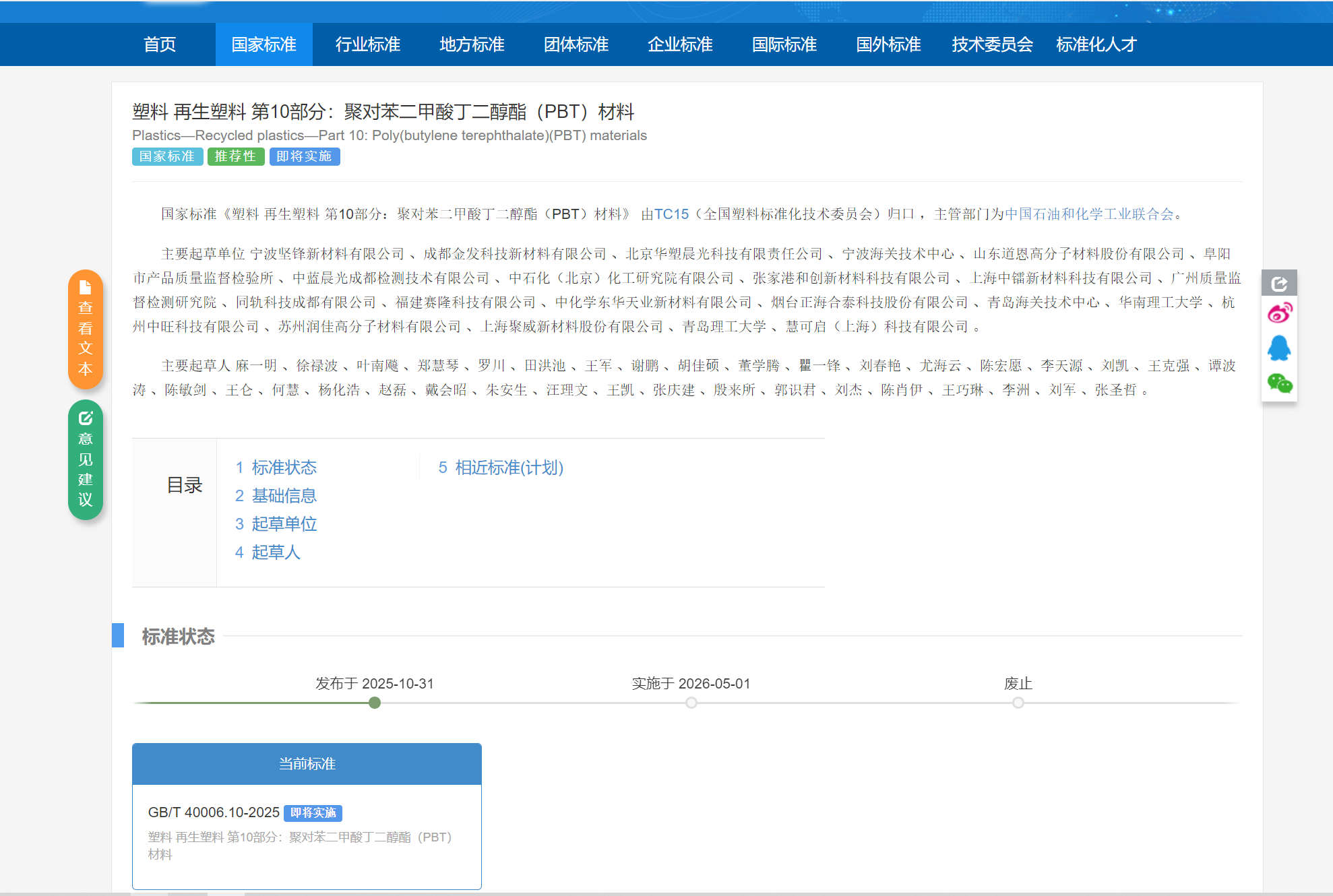Abstract
The National Administration for Market Regulation has recently officially released the national standard for recycled Polybutylene Terephthalate (PBT) material. Ningbo Topcentral New Materials Co., Ltd. served as the primary drafting unit, with the company's founder and CEO, Mr. Ma Yiming, acting as the primary drafter. This standard fills a gap in the industry and is expected to promote the application of recycled PBT in sectors such as automotive and electronics, contributing to the achievement of carbon peak and carbon neutrality goals.
New National Standard for Recycled PBT Established, Ushering in New Industry Norms

Recently, the National Administration for Market Regulation (Standardization Administration of China) officially released the national standard "Plastics — Recycled plastics — Part 10: Polybutylene terephthalate (PBT) materials". This marks a critical step forward in the standardization of recycled plastics in China, particularly in the field of recycled PBT materials, and holds milestone significance for promoting a green, standardized, and high-quality development across the entire industry chain.
With the increasing global emphasis on sustainable development and the circular economy, the application of recycled plastics has become a vital direction for the transformation and upgrading of the plastics industry. Polybutylene terephthalate (PBT), as a high-performance engineering plastic, is widely used in automotive, electrical and electronic, telecommunications, and other fields. However, the lack of unified and scientific quality assessment standards for recycled PBT materials has severely restricted their promotion and application in downstream high-end products, impacting the efficiency of resource circulation.
The newly released national standard "Plastics — Recycled plastics — Part 10: Polybutylene terephthalate (PBT) materials" precisely addresses this industry pain point. This standard specifies the classification and designation, technical requirements, test methods, inspection rules, as well as requirements for marking, packaging, transportation, and storage throughout the entire process for recycled PBT materials. It provides an authoritative technical basis for the production, processing, trade, and use of recycled PBT raw materials, which will effectively standardize market order, improve product quality, and enhance downstream customers' confidence in using recycled materials.
Topcentral®: Deep Expertise in Recycled PBT Technology, Laying the Foundation for Standards with Practical Results
As the primary drafting unit for this standard, Ningbo Topcentral New Materials Co., Ltd. has long focused on the R&D and innovation of polymer new materials and recycling technologies, accumulating profound technical strength and extensive practical experience in the field of recycled plastics. Mr. Ma Yiming, the company's founder, serving as the primary drafter, led the technical team in incorporating years of industrial insight and technical achievements into the standard development process, ensuring the standard's scientific nature, advancement, and practicality.
"We have always believed that technological innovation and standard leadership are the dual drivers for industry upgrading. Leading the development of this national standard for recycled PBT is both a recognition of our years of technical accumulation and a greater responsibility for us to promote the industry towards high-quality circular development," stated Ma Yiming, Founder and CEO of Topcentral.
It is this R&D philosophy of "Activate Human Better Life" that has enabled Topcentral® technical achievements to transform into criteria followed by the entire industry.
Moving Forward Together: Calling for Industry-Wide Adoption of Compliant Recycled PBT Materials
Currently, the global wave of sustainable development and the circular economy is sweeping through the plastics industry. The release of this national standard provides clear direction for the sector. Here, we call for collective action across the entire industry chain:
-
Downstream manufacturing enterprises (in automotive, electrical and electronic, telecommunications, etc.) should prioritize procuring recycled raw materials that comply with the national standard "Plastics — Recycled plastics — Part 10: Polybutylene terephthalate (PBT) materials" to promote the construction of green supply chains.
-
Technical personnel need to strengthen their study and application of the new standard to ensure compliant production processes and enhance product quality stability.
-
Recycled plastics enterprises should actively benchmark against the national standard, increase investment in technological R&D, and transition towards high-technology and high-quality development.
-
Industry associations and scientific research institutions should play a bridging role, promote the application of the standard, organize technical exchanges, and collectively build a green ecosystem for recycled PBT materials.
Industry experts point out that the release and implementation of this national standard not only fills the standard gap in the field of recycled PBT materials but will also strongly promote the improvement of China's plastic recycling system. On one hand, it guides resource recycling enterprises towards high-technology and high-quality development; on the other hand, it provides reliable supply chain assurance for terminal brand companies advocating green design. It serves as crucial technical support for achieving the "dual carbon" goals and building a green manufacturing system.





